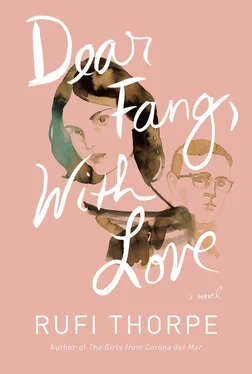The boys and their mother and aunt were sent to a work camp in Batakiai where they stayed for two months. There were rumors that the camp would be liquidated, and Josef’s mother and aunt and grandmother sat the boys down and told them that they must escape. They were young and strong and had the best chance of surviving if they were unhampered by women and children. Their aunt had her three-year-old and a six-year-old with her in the camp. “Be like rabbits,” their mother told them. “Hide in the woods. Get word to the rest of our family and they will take care of you.” They had family in Australia, and their mother wrote down the address for them on little pieces of paper that she sewed into their underwear. Josef begged their mother to come with them, but she would not.
The two boys set off at midnight. They zigzagged through the camp, and managed to climb the fence and get safely into the woods. From there they did not know where to go. They spent a crucial three days undecided, starving in the woods. Luckily it was summer, so they were not cold. Eventually, forced by hunger and thirst to explore deeper into the woods, they found a road. They argued over which direction to go, but finally decided to head south. They were picked up almost immediately by the police. Saul, for reasons unfathomable to Josef, refused to talk. “My brother can’t talk,” Josef told the police officers, the lies simply sprouting from his lips. “He is simpleminded. We were sent out to the market by our father to fetch medicine for my grandmother who is gravely ill.”
Josef swore up and down that they were Catholic and was smart enough to give them the Lithuanian versions of their names: Salius and Juozas. But the Lithuanian police pulled down their pants and saw at once that they were circumcised. The boys were arrested and placed in holding cells until they could be transported back to the camp. The police station was a commandeered farmhouse and the “cells” they were placed in were closets, a linen closet for Saul and what must have once been a pantry for little Josef.
That was what it would all hinge on: the lack of windows in a linen closet. In Josef’s pantry there was one tiny window up high. It did not open, but he discovered he could climb up to it by bracing himself against the walls, and the casement, when he knocked on it with his knuckles, was loose. Late at night, he took some dusty old cans of fish and carefully tap-tapped the casement of the window entirely loose. He climbed down with it, but fell the last few feet. He waited, unable to breathe to see if anyone had heard. He had fallen on his ankle in a bad way, but it was only sprained, not broken. “He always said if he had been just one day older, he would not have been able to fit through that window,” Susan said.
Hungry and scared and crying because he was leaving his brother and he suspected the rest of his family was already dead, Josef headed into the forest to try to be a rabbit as his mother told him. He almost starved to death there, and he once got very sick from eating the wrong kind of berries. He found a farm and he observed the woman working in her garden every day. He stayed in the woods, afraid, watching the family for more than a week. There was one man and one woman. They were both in their fifties. At night, he would sneak to get water from their well and steal carrots and fruit from their garden. They went to church on Sunday, and over the period of about eight days, he convinced himself they were good people. One morning he approached the woman in her garden. He must have looked like a ghost, appearing among her black currant bushes, half starved and dirty-faced. “Please,” was the first word he said to her. Then, “My family is dead.”
She took him in. It turned out that her husband was a member of the Lithuanian police force working for the Germans, but he too agreed to hide the boy. They hid him in the attic whenever anyone came over and the woman taught him how to knit. That was how he spent the war, knitting in the attic. He became an excellent knitter and could make even complicated cable-knits and fine sweaters, impossibly tiny socks, anything. “I still have sweaters my father knitted me,” Susan said.
“So you’ve been looking for Saul,” I said.
She nodded. She brushed powdered sugar from the cookie off her chin. “My father spent the rest of his life feeling so terrible about not saving Saul. He would tell me how wonderful Saul was. How smart. How brave. I thought if I could find him, or even just find out what happened to him…I don’t know what.”
“Is your father still alive?” I asked.
She shook her head. “Stroke,” she said. “Last January.” So she had come here to mourn her father as well as to search for Saul. I reached out and grasped her calf. The skin was cool and smooth under my hand. I squeezed the muscle.
“This searching, this constant searching, it’s like a disease of the mind,” she said. “Trying to piece things together, but none of it can be put back together. But you can’t stop searching. It’s a compulsion.”
I kissed her foot. She looked at me. I kissed her toes, one by one, light little kisses. She smiled. She arched her foot, and I kissed her heel. I kissed her ankle and then her shin bone. She laid back on the bed and spread her legs, and I kept on kissing upward.
She was the descendant of a sly rabbit of a boy, and I was the descendant of a wild, murdering girl. What did it mean about us, on this rented mattress, in this rented room, in this world that would be ours for such a short time?
“Please,” she said, “just keep me from being me for a little while. Just make me stop thinking. Just make me—” She broke off.
I didn’t want to be me, either. I didn’t want to think about Agata or Grandma Sylvia or Katya or Vera. I didn’t want to think about my father, his arched eyebrows, his Iago, his rabbits dissolving into air. I didn’t want to think about Chloe, who still burned in my memory, crying on the bed, saying, “I just miss my mom. That’s all. I just miss my mom.”
I wanted only Susan’s thighs, Susan’s globed breasts like dangling fruit, Susan’s amber hair in wet curls, Susan’s salt, Susan’s cries, Susan’s lip pulled back over her teeth. I wanted sour-plum skin and ripped fruit. I wanted to be nothing but a body moving over Susan’s body, nothing but our cells, dying and dividing, the chemicals of pleasure rolling loose into our bloodstreams.
Date: 7/18/2014 5:34 PM
From: Vera.Abramov@gmail.com
To: FangBoy76@hotmail.com
Subject: Re: re: Are you ignoring me?
Dear Fang,
Please do not give up on me. Please. I’m sorry. I take back everything. I am the same as I always was. I am yours. Please. I need you so badly.
With love,
From Vilnius,
Eternally,
V
WHEN I GOT BACK to the apartment it was dark, and the waitresses in the restaurant downstairs had turned off the light in the stairwell and I couldn’t find the switch, so I ascended in such pitchy black that I couldn’t even tell if my eyes were open and kept blinking to make sure. I pushed open our door, which was unlocked, and bumped into a wire drying rack covered in wet men’s clothes. I recognized the drying rack, but not the clothes. Why were another man’s clothes drying in our apartment?
“Vera?” I called. There was a light on in the kitchen.
“Papa, go away and come back later,” Vera yelled.
“Please come in here, sir,” said a male voice.
I tried for a second to just edge the rack by pushing with the door, hoping it wouldn’t tip, but then I heard the man’s voice again, “Please, Lucas!” and realized it was Daniel. I opened the door hard, knocked over the rack of wet clothes, and tripped over it on my way to the kitchen.
Читать дальше












